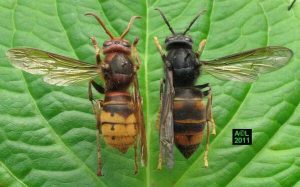Bees and Warm Wet Winters
Share
My poor bees are having another terrible winter. "Terrible" winters for honeybees are warm and wet, not cold, which they can deal with quite happily.
If it's consistently warm and wet they're in trouble. They are too active, eating their winter stores of honey too quickly. After a while they starve, which is why beekeepers "heft" their hives - to feel how heavy they are, to assess how much honey is left in them. If not much they can be fed fondant to keep them going.
Better though would be to give the bees nearby forage, so that on dry days at least they can get out and bring some food back to the hive. We have some "trees for bees" on our website, which can help. It's also worth thinking about early flowering bulbs like crocuses.
This pre-supposes that dry winter days are also warm, which isn't what's happening in Somerset at least. It's either warm enough for the bees to be active but too wet for them to fly or sunny but colder. Grrr...
Bumblebee queens are only slightly better off as they can fly in lower temperatures and in drizzle. They will break hibernation on a warm day. I've seen queen wasps, which follow a similar life cycle, as recently as the last frost. I can guarantee low Social wasp populations here next year already.
 Which is European?These warm wet winters bring another ill for honeybees. The Asian hornet, Vespa velutina has reached these shores. It is an aggressive animal and a voracious predator of honeybees. Without colder weather it will spread rapidly and spell disaster for unguarded colonies.
I also fancy it is very bad news for our own European hornet, which is a relatively harmless* but much persecuted and increasingly rare beauty. Many more will now be killed, through paranoia and mistaken identity. Gone from our gardens will be their lovely baritone buzz - another victim, in a way, of climate change.
*not what I felt when I dried myself off after a dip on holiday last year with a hornet tangled in the towel - OUCH!
Which is European?These warm wet winters bring another ill for honeybees. The Asian hornet, Vespa velutina has reached these shores. It is an aggressive animal and a voracious predator of honeybees. Without colder weather it will spread rapidly and spell disaster for unguarded colonies.
I also fancy it is very bad news for our own European hornet, which is a relatively harmless* but much persecuted and increasingly rare beauty. Many more will now be killed, through paranoia and mistaken identity. Gone from our gardens will be their lovely baritone buzz - another victim, in a way, of climate change.
*not what I felt when I dried myself off after a dip on holiday last year with a hornet tangled in the towel - OUCH!
 Which is European?
Which is European?
